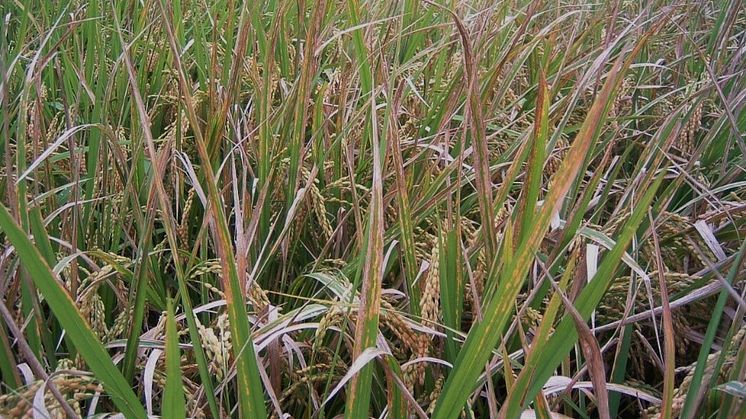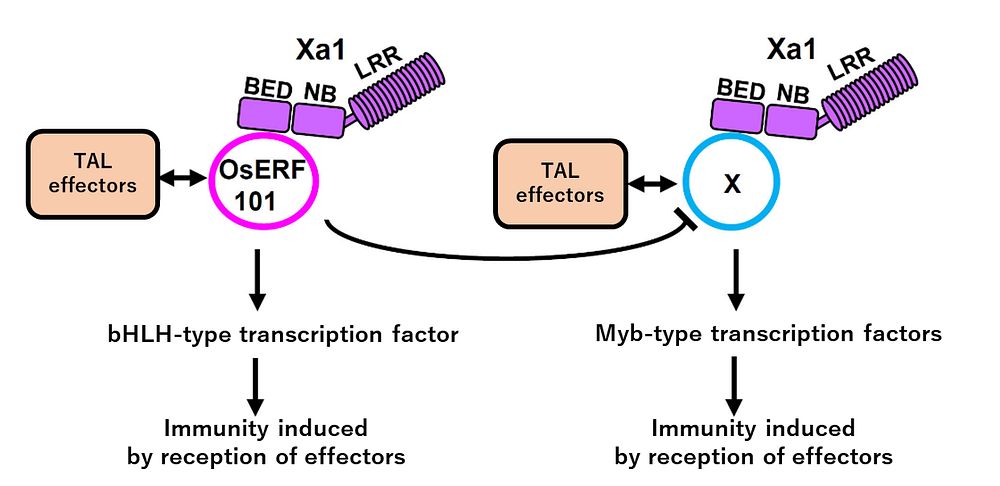
Press release -
Finding the source of pathogen infectivity in rice to reveal the mechanism of induction of immunity:A new insight into the development of disease-resistant plants -- Kindai University
A research team led by Ayaka Yoshihisa (1st year doctoral student) and Satomi Yoshimura (researcher) at Department of Advanced Bioscience, Graduate School of Agriculture, Kindai University (Nara-city, Nara) and Tsutomu Kawasaki (professor) at Agricultural Technology and Innovation Research Institute, Kindai University conducted a joint research with Iwate Biotechnology Research Center (Kitakami-city, Iwate) and Kyoto University (Kyoto-city, Kyoto) and found the molecular mechanism of how rice induces robust immune responses by recognizing the most important virulence factors of rice pathogen, which causes bacterial blight disease, one of the most important rice disease in the world. It is expected that the findings of this research will contribute to development of disease-resistant plants. This research was published in the “New Phytologist” on Thursday, September 1, 2022 (Japan time). “New Phytologist” is an internationally well-known journal in the field of plant science.
1. Key points
- Discovered a transcription factor called “OsERF101” that plays an important role in rice immunity
- Elucidated the mechanism by which rice pathogen recognition receptor activates immunity by recognizing the most important virulence factors of the pathogens.
- Expected that this research will contribute to a new development of disease-resistant plants.
2. Background
Yield loss due to disease in agricultural production is about 15%, which is equivalent to food for 1 billion people. In recent years, due to global environmental changes and the movement of pathogenic bacteria and insect pests associated with international trade, disease outbreaks have occurred in areas where there was no disease occurrence before. There have been many reports of new pathogens emerging, causing pandemics in plants and devastating crops. To solve these current problems, it is necessary to develop next-generation disease-resistant technology and maintain sustainability and stability in food production. Pathogens Xanthomonas and Ralstonia species, which cause great damage to crop production, have specific virulence factors called Transcription Activator-Like (TAL) effectors, which hijack host transcriptional machinery. A pathogen recognition receptor (sensor) found in rice, Xa1, is known to recognize the TAL effectors and induce of strong immune responses, but the molecular mechanisms controlling the induction of Xa1-mediated immunity was unknown.
3. Overview
The research team analyzed the interaction between Xa1, a rice pathogen recognition receptor (sensor), and the TAL effectors of bacterial blight pathogen. The result of this research revealed that the BED domain of Xa1 interacts with TAL effectors, indicating that perception of the TAL effector through the Xa1 BED domain activates immune responses. Furthermore, to elucidate the regulatory mechanism of Xa1-mediated immunity, the research team searched for factors that interact with Xa1 and discovered a transcription factor called "OsERF101". They also found that OsERF101 plays a pivotal role in the recognition of TAL effectors and induction of Xa1-mediated immunity. TAL effectors are known to be the main cause of plant diseases caused by the pathogens Xanthomonas and Ralstonia species. Therefore, the Xa1-mediated immune system is expected to be utilized to prevent serious diseases caused by these pathogens.

Journal name:
New Phytologist (Impact factor: 10.323@2021)
Research paper title:
The rice OsERF101 transcription factor regulates the NLR Xa1-mediated immunity induced by perception of TAL effectors
Authors:
Sayaka Yoshihisa1, Satomi Yoshimura1, Motoki Shimizu2, Sayaka Sato1, Shogo Matsuno1, Akira Mine3, Koji Yamaguchi1, Tsutomu Kawasaki1,4*
*Corresponding author
Affiliation:
1 Department of Advanced Bioscience, Graduate School of Agriculture, Kindai University
2 Division of Genomics and Breeding, Iwate Biotechnology Research Center
3 Graduate School of Agriculture, Kyoto University
4 Agricultural Technology and Innovation Research Institute, Kindai University
URL:
https://nph.onlinelibrary.wiley.com/doi/10.1111/nph.18439


